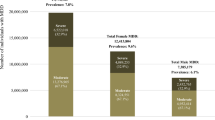Abstract
Objective
To evaluate the relationship between adherence to antidepressant therapy and economic outcomes.
Design
Retrospective database analysis using pharmacy and medical claims from a pharmacy benefit and medical management company serving a large managed care organization (MCO) that provides healthcare coverage for approximately 3.5 million members.
Participants
Patient selection was based on the following criteria: (i) newly started on antidepressant therapy between 1 April 1999 through 30 June 1999; (ii) titrated to ausual antidepressant dosage level within 6 months of the initiation of therapy; (iii) continuously enrolled in the health plan between 1 January 1999 through 31 December 1999; and (iv) >18 years of age.
Outcome measures
Antidepressant adherence was calculated as a ratio of the total number of day’s supply during the 180-day follow-up period divided by 180 days. Patients were defined as adhering to treatment if they had a ratio of ≥0.70. The means of pharmacy ingredient costs, medical charges and total healthcare charges incurred during the follow-up period were compared. Adjusted means (least squares means) were calculated after adjusting for potential confounding factors that may have influenced relevant outcomes.
Results
Of the total cohort (14 190 patients), 39.7% (n = 5638) of patients were deemed to be adhering (≥70.0% completion) to their treatment. Adherent patients were significantly more advanced in age (55.2 vs 54.3 years, p < 0.01) and had a higher mean Chronic Disease Score (3.80 vs 3.47, p < 0.0001). After adjusting for confounding factors, adherent patients incurred lower total healthcare charges ($US11 327 vs $US11 815, p = 0.433) significantly lower medical charges ($US9411 vs $US10 692, p = 0.039) and significantly higher pharmacy charges ($US1915 vs $US1123, p < 0.0001) than non-adherent patients during the initial 6 months of therapy (all 1999 values).
Conclusion
In this MCO, patients who were adherent with antidepressant therapy possessed significantly lower medical charges. These findings indicate that patient adherence with antidepressant therapy significantly improved the economic outcomes. It is suggested that there is a need for raising awareness about the importance of patient adherence as well as to improve methods of detecting individuals with depression in order to gain the economic benefits associated with adherence.




Similar content being viewed by others
References
Goldman LS, Nielsen NH, Champion HC. Awareness, diagnosis, and treatment of depression. J Gen Intern Med 1999; 14(9): 569–80
Robins LN, Regier DA. Psychiatric disorders of America: the Epidemiologic Catchment Area study. New York: Free Press, 1991
Luber MP, Hollenberg JP, Williams-Russo P. Diagnosis, treatment, comorbidity, and resource utilization of depressed patients in a general medical practice. Int J Psychiatry Med 2000; 30(1): 1–13
ScriptAssist. Medication compliance programs [online]. Available from URL: http://www.scriptassist11c.com [Accessed 2003 Oct 1]
Thompson DT, Buesching D, Gregor KJ, et al. Patterns of antidepressant use and their relation to costs of care. Am J Manag Care 1996; 2(9): 1239–46
Katon W, Von Korff M, Lin E. Adequacy and duration of antidepressant treatment in primary care. Med Care 1992; 30: 67–76
Greenberg PE, Stiglin LE, Finkelstein SN, et al. The economic burden of depression in 1990. J Clin Psychiatry 1993; 54: 405–18
White TJ, Chang E, Leslie S, et al. Patient adherence with HMG reductase inhibitor therapy among users of two types of prescription services. J Manage Care Pharm 2002; 8: 186–91
Melikian C, White TJ, Vanderplas A, et al. Adherence to oral antidiabetic therapy in a managed care organization: a comparison of monotherapy, combination therapy, and fixed-dose combination therapy. Clin Ther 2002; 24: 460–7
Wan GJ, Yu-Isenberg K, Fontes CL. Treatment adequacy with selected antidepressants by generalist physicans [abstract]. J Gen Intern Med 2003; 18: 298
Melikian CJ, Vanderplas A, Dezii C, et al. Diabetes medication compliance, glycemic control and economic outcomes: a managed care perspective [poster presentation]. Academy of Managed Care Pharmacy, 2002 Education Conference; Washington, DC: 2002 Oct 9–12
American Medical Association. International Classification of Diseases, Ninth Revision, Clinical Modification. Chicago (IL): American Medical Association, 1999.
National Committee for Quality Assurance. National Results for Selected 2000 HEDIS® and HEDIS/CAHPS® Measures [online]. Available from URL: http://www.ncqa.org/programs/hedis/antidepressant00.htm [Accessed 2003 Oct 28]
Von Korff M, Wagner EH, Saunders K. A chronic disease score from automated pharmacy data. J Clin Epidemiol 1992; 45: 197–203
Demyttenaere K, Van Ganse E, Gregoire J, et al. Compliance in depressed patients treated with fluoxetine and amitriptyline. Int Clin Psychopharmacol 1998; 13: 11–7
Salzman C. Medication compliance in the elderly. J Clin Psychiatry 1995; 56 Suppl. 1: 18–22
Acknowledgements
The research described in this manuscript was funded by Bristol-Myers Squibb Company, Princeton, New Jersey, USA. This study was conducted by researchers from the Pharmacoeconomics and Health Outcomes Research Department of Prescription Solutions, a pharmacy benefit and medical management company in Costa Mesa, California, USA, and Bristol-Myers Squibb.
Author information
Authors and Affiliations
Corresponding author
Rights and permissions
About this article
Cite this article
White, T.J., Vanderplas, A., Ory, C. et al. Economic Impact of Patient Adherence with Antidepressant Therapy Within a Managed Care Organization. Dis-Manage-Health-Outcomes 11, 817–822 (2003). https://doi.org/10.2165/00115677-200311120-00006
Published:
Issue Date:
DOI: https://doi.org/10.2165/00115677-200311120-00006




